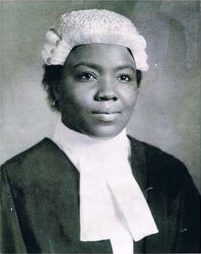Political career
In the early 1950s, Vera Chirwa joined forces with Rose Chibambo to form the Nyasaland African Women's League, which worked with the Nyasaland African Congress to gain Nyasaland's separation from the unpopular Federation of Rhodesia and Nyasaland. [3] She became Nyasaland's first woman lawyer, and was a founding member of the Malawi Congress Party in 1959. [4] After Nyasaland gained self-government in 1961 and became the independent state of Malawi two years later, Orton Chirwa, Vera's husband, became a senior figure in the new government as Minister of Justice and Attorney General. [4]
After having a falling out with Kamuzu Banda, Chirwa and her husband were declared enemies of the state. [5]
Exile and capture
The couple were forced into exile in Tanzania a few weeks later by Banda. They lived in Tanzania, but traveled to Zambia, Great Britain and the United States of America. [6] On Christmas Eve 1981, Vera and Orton Chirwa were kidnapped in the East of Zambia by Malawi security forces and taken back to Malawi to face charges of high treason. [2]
Trial
The Chirwas were tried by a “traditional” court. Both lawyers, conducted their own defense, as traditional courts did not allow defence lawyers in a trial lasting two months in front of judges appointed by Dr. Banda. This case of demonstrated the deficiencies in the system. At the end of their appeal in 1983, the minority of the appellate judges that had legal training opposed the guilty verdict, but it was overruled by the majority composed of traditional chiefs. [7] On the day of the trial Vera defiantly raised her hand to speak and looking the magistrate straight in the eye asked him on what grounds they were accused. Questioning the court was forbidden and the response she received was, "Nothing but you are culprit!". [2]
At their trial, the Chirwas claimed that they had been abducted from Zambia in December 1981. This, and the charge that they had conspired to overthrow the government outside Malawi, should have meant that the Traditional courts had no jurisdiction. The case could still have been heard in Malawi's High Court, but that court required proof of guilt beyond reasonable doubt. The treason case heard against the Chirwas by the Southern Region Traditional Court in 1983 was based on handwritten documents said to have been found in a bag belonging to Vera when she was arrested, and a police officer's “expert” testimony that they were indeed in Orton Chirwa's handwriting. An unsigned statement said to have been made by Orton Chirwa, but repudiated by him, and a transcript said to have been made of a taped interview he had given were also admitted as evidence. This evidence, dubious as it was, was evidence only against Orton Chirwa, not Vera. The only case against her was that the documents were said to have been found in her bag, which she denied. The Chirwas were not allowed to call witnesses from outside Malawi and were both sentenced to death. [8] After the trial, the couple were taken to the central prison in Zomba. According to Chirwa, "En route we forgave the people who gave false testimonies, the judges and even the President." It was the last time she and her husband traveled together. [2]
On the Chirwas' appeal to the National Traditional Court of Appeal, the refusal of the lower court to allow defence witnesses, its admission of Orton Chirwa's unsigned statement and its acceptance of a police officer as an expert witness were all criticised, and minority of the judges did not accept that his creation of an unpublished handwritten documents amounted to treason. However the appeal court came to the startling conclusion that, even if the Traditional courts had no jurisdiction in law, they had a traditional right to try the Chirwas, and that (despite the deficiencies in the lower court's handling of the case), their decision was correct and should stand. The death sentences were commuted, but Orton Chirwa later died in prison. [9]
Imprisonment and release
Conditions in the female ward were tough. [2] Chirwa was subjected to torture and other forms of brutality. She slept on the cement floor, refused to eat the vile food, and was denied visitors, letters from her husband and the right to go outside. [2] She remained in prison on death row for 12 years but remained hopeful for release. [2] She credits her Christian faith for enabling her to keep hope and faith. [2]
In 1990 Amnesty International launched an urgent action to release Orton and Vera Chirwa. In autumn 1992, when a delegation of British legal experts was allowed to pay them a visit, the Chirwas were allowed to see one another again for the first time in 8 years. [2] Orton died in his cell 3 weeks later at the age of 73. Chirwa was not able to attend the funeral. [2]
Banda pardoned her for "humanitarian reasons", and she was released on January 24, 1993 when the country was transitioning to a multi-party state following the end of Banda's rule. [2]
This page is based on this
Wikipedia article Text is available under the
CC BY-SA 4.0 license; additional terms may apply.
Images, videos and audio are available under their respective licenses.
